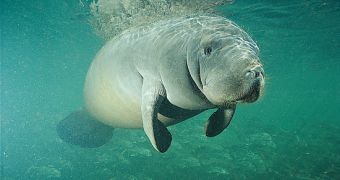Despite the fact that they benefit from legal protection in Florida, manatees are not exactly doing great. On the contrary, recent reports show that, since the beginning of this year a total of 769 such aquatic creatures have died.
Given the fact that it will be another two months until the end of this year, odds are the death toll for this species, which happens to already be a record-breaking one, will increase to a considerable extent.
“This year just became the deadliest year ever for Florida's endangered manatees. In total, 769 manatees have died so far this year from all causes from January 1st through October 29th, making it the largest annual manatee die-off in Florida since record-keeping began,” green group Save the Manatee writes in a press release.
“The previous record was set in 2010 when biologists with the Florida Fish and Wildlife Conservation Commission documented 766 deaths after hundreds of manatees died from cold stress during that extremely cold winter,” it adds.
Huffington Post informs us that, as far as wildlife researchers can tell, an unexpected bloom of toxic red algae in Floridian waters is to blame for most of these deaths.
A so-called “mass murder mystery” in the Indian River Lagoon, where 47,000 acres of sea grass suddenly died, appears to have also killed little over 100 manatees.
The same source tells us that, of the hundreds of sea cows to have lost their lives since the beginning of this year until present day, 126 were calves.
“What we put into our waters, how much we pump from our aquifer and draw from our springs and rivers, together with how we use our waterways, all has an impact on our own lives and the lives of every aquatic species.”
“We must demand better stewardship of our waters and waterways or suffer even more severe consequences going forward,” Save the Manatee stresses.
The conservationists ask that people who want to help safeguard whatever manatees are left to inhabit Floridian waters visit the organization's website and donate.

 14 DAY TRIAL //
14 DAY TRIAL //